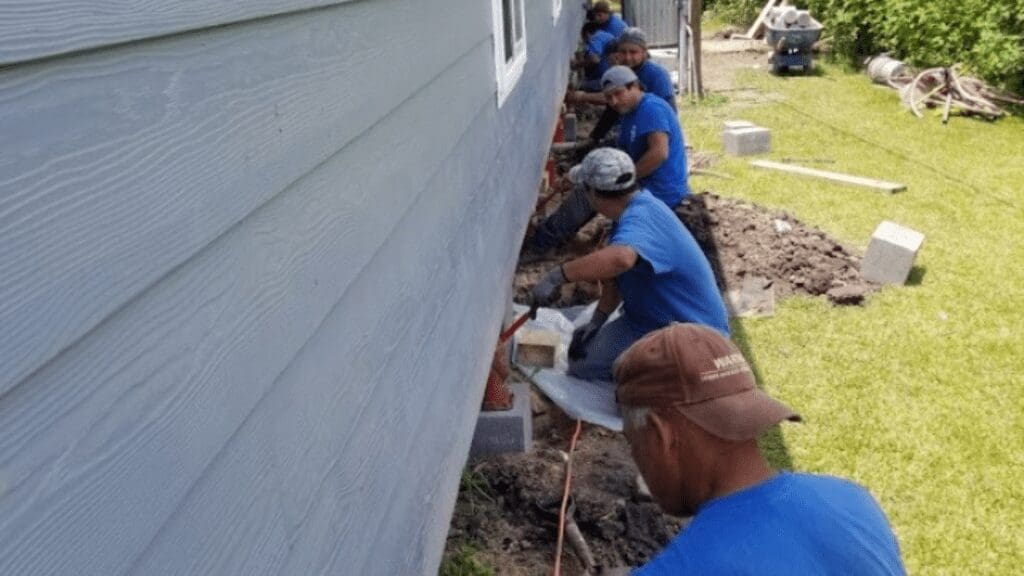Because differential settlement could spell trouble for an older or new house located in the Houston-Galveston area, let’s take a look at the 3 most important reasons why you shouldn’t wait to have your home leveled back to its original position.
Reason #1: Avoid Severe Foundation Damage
Although there are a series of factors that could cause a Houston home to become unlevel, clay soil is typically the main culprit behind this issue. When the clay soil underneath a foundation is exposed to significant variations in the moisture content, it undergoes significant volume changes. If these changes occur repeatedly, one section of the foundation could sink into the ground more readily than the others. As a result, the foundation may settle unevenly, causing the structure above to become unlevel.
As well, depending on their location under the floor, wooden beams or joists that are affected by rot or termites could lead to sloping or uneven floors in your home. Because rotted or termite-damaged wood becomes porous and soft, it often compresses under the weight of different home components. In that case, the corresponding areas of the subfloor may start to sink, forcing the floor above to get out of level or sag in some parts. Sloping or uneven floors can make a home look unlevel.
Any of the aforementioned issues could create additional stresses on your foundation, which might have a number of unwanted side effects, such as:
- Extensive deterioration of the foundation;
- Damage to walls, flooring, and ceiling;
- Warping of the home’s frame;
- Warping or twisting of door and window frames, which might prevent the doors and windows from aligning and latching properly;
- Structural instability that could render your home uninhabitable.
Irrespective of what factors might have caused your home to appear or become unlevel, having your property inspected by a foundation repair professional immediately could help you prevent further damage throughout your home. If your home needs leveling or any other type of foundation work, it’s essential to know that foundation repair projects typically involve repairing all the foundation issues found. This essentially means that the contractor will also fix the problem that has caused the damage in the first place.
Reason #2: Prevent Structural Cracks
A home is subject to different types of vertical, horizontal, and longitudinal loads. As a result, a series of tensile, compressive, bending, and/or shear forces will act on every single element that’s included in it. When a home is no longer level, some of those forces are redirected at different angles. This could lead to all sorts of problems, including deep and wide cracks in the walls, floors, and ceiling.
While hairline cracks aren’t usually dangerous, diagonal or stair-step cracks wider than 1/8 of an inch often indicate a greater underlying problem. What’s more, if a crack develops as a result of differential settlement, damaged wood beams or joists, or any other structural issue that has affected your home somehow, it’s important to know that it won’t go away on its own. In fact, the opposite will happen, as most cracks tend to grow deeper and wider over time.
When a crack becomes too deep and/or wide, it could lead to pest infestations in your home. Furthermore, cracks are usually aggravated by water and moisture, which may cause them to extend even more. As moisture and water will eventually enter your wall, floor, and/or ceiling system, they could create a whole host of problems, including mold growth, discoloration, corrosion, and even a variety of structural issues that could culminate in potentially irreparable damage. Luckily, you can prevent all these problems by simply hiring a team of professionals to re-level your home and make all the repairs necessary.
Reason #3: Avoid Bowing Walls
When a home becomes unlevel, some of the loads may shift and put more stress on specific structural components, such as load-bearing walls. In addition to leading to deep cracks, extreme positive or negative stress could cause a load-bearing wall to bow and even collapse, which may threaten the structural integrity of your entire home. To avoid excessive stress on structural elements along with their potential consequences, it’s recommended to consult an experienced foundation repair contractor as soon as you observe any of the signs indicating a potential structural problem in your home.
Depending on the type and extent of the damage, a series of repairs might be necessary to fix a foundation. But regardless of what repairs may be required, leveling a home and fixing foundation damage is not a DIY job. So, if you think your home needs foundation repairs, the best way to go about it is by getting in touch with our professionals, who can fix any foundation issues affecting the homes in the Greater Houston area.

